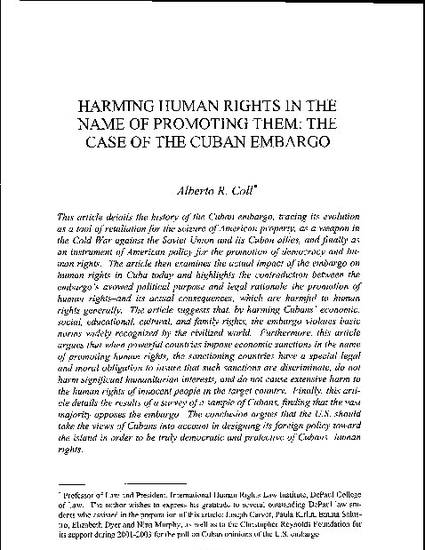
Article
Harming Human Rights in the Name of Promoting Them: The Case of the Cuban Embargo
UCLA Journal of International Law & Foreign Affairs
(2007)
Abstract
This article details the history of the Cuban embargo, tracing its evolution as a tool of retaliation for the seizure of American property, as a weapon in the Cold War against the Soviet Union and its Cuban allies, and finally as an instrument of American policy for the promotion of democracy and human rights. The article then examines the actual impact of the embargo on human rights in Cuba today and highlights the contradiction between the embargo's avowed political purpose and legal rationale-the promotion of human rights-and its actual consequences, which are harmful to human rights generally. The article suggests that, by harming Cubans' economic, social, educational, cultural, and family rights, the embargo violates basic norms widely recognized by the civilized world. Furthermore, this article argues that when powerful countries impose economic sanctions in the name of promoting human rights, the sanctioning countries have a special legal and moral obligation to insure that such sanctions are discriminate, do not harm significant humanitarian interests, and do not cause extensive harm to the human rights of innocent people in the target country. Finally, this article details the results of a survey of a sample of Cubans, finding that the vast majority opposes the embargo. The conclusion argues that the U.S. should take the views of Cubans into account in designing its foreign policy toward the island in order to be truly democratic and protective of Cubans' human rights. Reprinted by permission of the publisher.
Disciplines
Publication Date
Fall 2007
Citation Information
Alberto R. Coll, Harming Human Rights in the Name of Promoting Them: the Case of the Cuban Embargo, 12 UCLA J. Int'l L. & Foreign Aff. 199 (2007)
